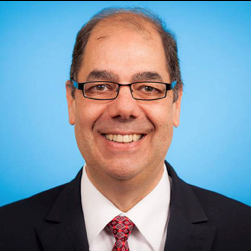Canadian Blood Services scientist Alan Lazarus honoured by the Canadian transfusion community

Like many in the Canadian transfusion medicine community, Dr. Alan Lazarus should be travelling to Montreal, QC this week to attend the now cancelled Canadian Society for Transfusion Medicine 2020 conference. Not being able to gather together with colleagues this year must be especially bittersweet for Dr. Lazarus, who is the recipient of the 2020 Ortho Award. This prestigious award recognizes an individual who has provided a major service or innovation in transfusion medicine.
Dr. Lazarus is a senior scientist at Canadian Blood Services, and a professor in the Faculty of Medicine at the University of Toronto, a scientist at the Keenan Research Centre for Biomedical Science at St. Michael’s Hospital in Toronto, a staff scientist in the department of laboratory medicine and pathobiology at St. Michael’s Hospital. He is being honoured for his extensive research work to understand the mechanism of action of IVIg in disease. Dr. Lazarus’ work in this area over the past two decades has helped advance our understanding of how IVIg, a biological drug derived from the plasma of thousands of blood donors, works in immune thrombocytopenia and other immune disorders. He has also done extensive research to find alternatives to IVIg, an expensive and in-demand therapy. Dr. Lazarus has recently shown that monoclonal antibodies that mimic anti-D may be effective in autoimmune diseases, which are often treated with IVIg. This indicates their potential to be developed as alternative treatments, which might reduce the use of IVIg. Dr. Lazarus holds several patents and has published dozens of highly-cited peer-reviewed publications.
In Montreal, Dr. Lazarus would have had the opportunity to give an award talk, receive the award in person and celebrate with his colleagues. I reached out to Dr. Lazarus at his home in Toronto to ask what he is working on now and how he plans to celebrate his award.

What are you working on right now?
“I am continuing my work related to replacing IVIg with monoclonal antibodies. Unfortunately, due to COVID-19, my laboratory is currently shut. However, we’re in the planning stages of some exciting research. We are hoping to bring our laboratory’s expertise with antibodies and immunology to bear to further understanding of COVID-19.
We plan to investigate how antibodies against the SARS-CoV-2 virus – the virus that causes COVID-19 – might mediate antibody-dependent enhancement of infection. Antibody-dependent enhancement is a phenomenon in which the antibodies produced to fight a virus lead to an increase in disease severity, rather than providing protection. This phenomenon occurs with many viruses, including dengue virus and SARS-CoV-2's close relatives in the coronavirus family, MERS and SARS-CoV-1 (the viruses that cause Middle East Respiratory Syndrome and SARS, respectively). It may help explain why the severity of COVID-19 disease varies widely; some patients have only a mild infection, while others become critically ill. We plan to investigate this phenomenon with SARS-CoV-2 in a laboratory setting to better understand the disease and inform the development of vaccines and therapies such as convalescent plasma.”
How will you celebrate winning the Ortho Award?
“I never really thought about celebrating, I think I’ll have a beer on my front porch!”
I think a beer is very well-deserved! Congratulations again to Dr. Lazarus!
CSTM is hoping to host a virtual Ortho Award lecture.
Dr. Lazarus joins a distinguished list of Canadian Blood Services’ colleagues who are past recipients of this honour:
Dr. Donald Branch (2003)
Dr. Morris Blajchman (2004)
Dr. Mindy Goldman (2005)
Dr. Debra Lane (2013)
Dr. Dana Devine (2015)
Dr. Jason Acker (2017)
In 2015, Dr. Lazarus was honoured by the AABB with the Tobor Greenwalt Memorial Award and Lectureship which recognized his outstanding contributions transfusion medicine.
Canadian Blood Services – Driving world-class innovation
Through discovery, development and applied research, Canadian Blood Services drives world-class innovation in blood transfusion, cellular therapy and transplantation—bringing clarity and insight to an increasingly complex healthcare future. Our dedicated research team and extended network of partners engage in exploratory and applied research to create new knowledge, inform and enhance best practices, contribute to the development of new services and technologies, and build capacity through training and collaboration. Find out more about our research impact.
The opinions reflected in this post are those of the author and do not necessarily reflect the opinions of Canadian Blood Services nor do they reflect the views of Health Canada or any other funding agency.